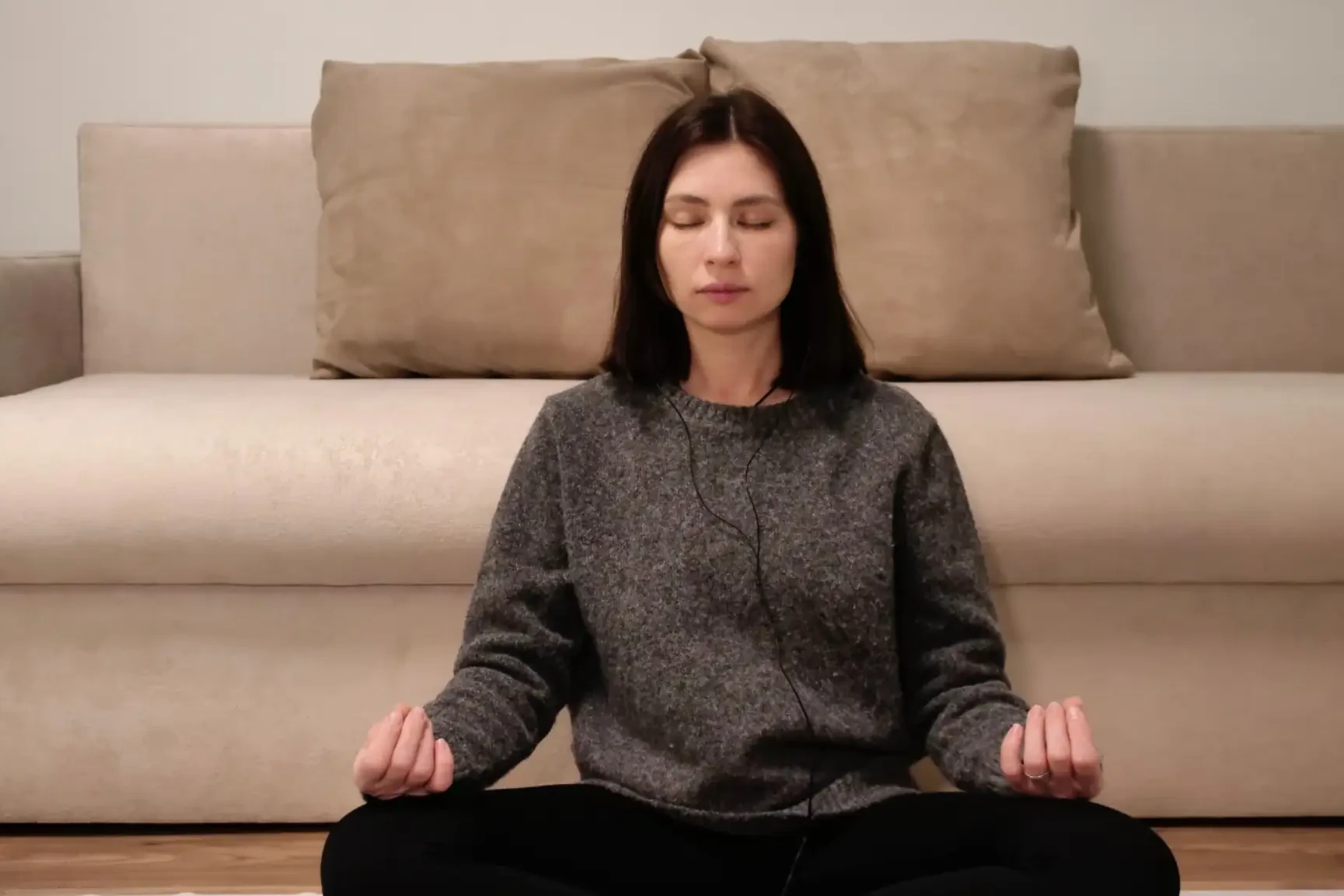Sleep apnea in hypothyroidism happens more often than many people realize, because low thyroid levels change how your airway, muscles, and breathing signals work at night. Hypothyroidism slows metabolism, increases fluid retention, and weakens throat muscles, which can narrow your airway while you sleep.
Sleep apnea occurs when the airway becomes too tight for steady airflow, causing loud snoring, choking episodes, and drops in oxygen. When doctors study both conditions together, they continue to find a clear link, even though the degree of risk can vary from person to person.
Current research shows hypothyroidism cause sleep apnea by raising airway pressure, swelling tissues, and reducing breathing strength, especially when weight gain is present. When both conditions occur together, they can intensify fatigue, mood changes, and heart strain. This is why spotting the connection early helps you get the right tests and treatments before symptoms grow worse.
Table of Contents
ToggleWhat Is the Link Between Hypothyroidism and Sleep Apnea?
Thyroid hormones keep throat muscles firm and help fluid balance. When hormones fall, throat tone drops. The tongue and soft tissues can swell from fluid. This narrows the airway and increases risk of sleep apnea in hypothyroidism . You should know the evidence in some areas is limited and based on small studies.
How Thyroid Hormones Regulate Breathing & Airway Muscles
Thyroid hormones support muscle strength and nerve signals that protect breathing. Low hormone levels reduce upper airway muscle tone. That makes airway collapse more likely during sleep. This mechanism partly explains why sleep apnea in hypothyroidism usually shows obstructive events.
Why People With Hypothyroidism Are More Prone To Airway Obstruction
You gain weight when metabolism slows. You may retain fluid in soft tissues. Your neck size can increase. Each change raises the chance of airway block. These changes make sleep apnea in hypothyroidism more likely. However, not everyone with low thyroid has apnea.
Differences Between OSA And CSA In Hypothyroid Patients
Obstructive sleep apnea (OSA) occurs when the airway collapses despite breathing effort. Central sleep apnea (CSA) occurs when the brain reduces breathing drive. In hypothyroidism, OSA is more common because airway tone and tissue changes drive collapse. CSA is less common but can appear if brain control is impaired. sleep apnea in hypothyroidism is therefore mainly a mechanical airway problem.
Can Hypothyroidism Cause Sleep Apnea?
Yes, low thyroid creates conditions that favor airway collapse. But you should not assume thyroid alone caused apnea. Risk rises markedly with obesity, older age, male sex, alcohol, and sedatives.
Doctors ask, can hypothyroidism cause sleep apnea , and recent studies answer with a cautious yes while noting limits in the data. Screening is reasonable when you have symptoms.
How Low Thyroid Hormones Contribute To Airway Narrowing
Low thyroid levels reduce muscle tone in the throat. Fluid may collect in the tongue and soft tissues. Those changes reduce airway space. The result is louder snoring and higher risk of sleep apnea in hypothyroidism . Keep in mind that larger, better studies are needed to prove exact risk levels.
Fluid Retention And Tongue/Neck Swelling In Hypothyroidism
Hypothyroid patients can retain fluid. You may notice puffiness, a swollen face, or a large tongue. That soft tissue swelling can narrow the airway. Clinical reports link this swelling to sleep apnea in hypothyroidism . Treating thyroid levels may reduce swelling over weeks to months.
Risk Factors That Worsen Sleep-Disordered Breathing
Weight gain and a large neck increase mechanical load on the airway. Alcohol and sedatives reduce muscle tone at night. Nasal congestion and smoking also raise risk.
If you have hypothyroidism plus these factors, your chance of sleep apnea in hypothyroidism increases further. Doctors look at the whole risk profile before testing.
Sleep Apnea Symptoms In Hypothyroid Patients
You may snore loudly, gasp or choke, and wake unrefreshed. Daytime sleepiness and problems focusing are common. These signs often point to sleep apnea in hypothyroidism . When you report them, clinicians may screen with short questionnaires and consider sleep testing. The Epworth Sleepiness Scale is one common screening tool.
Heavy Snoring, Choking, Gasping
Snoring often worsens when airway space shrinks. Gasping or choking and sudden awakenings are classic signs. If you notice these, mention sleep apnea in hypothyroidism to your provider.
Severe Daytime Fatigue And Brain Fog
Broken sleep harms cognition. You will feel tired and slow. Low thyroid adds to the fatigue. Together they make daytime function worse. These combined effects often drive evaluation for sleep apnea in hypothyroidism .
Morning Headaches And Dry Mouth
Morning headaches can follow repeated low oxygen at night. Dry mouth often means you breathe by mouth. These symptoms often appear with the sleep issues described above.
Low Mood And Cognitive Slowing
Low thyroid can slow thinking. Sleep loss makes mood and memory worse. The combination reduces quality of life. If you have mood or memory change plus sleep signs, tell your doctor.
Sleep Problems Common in Hypothyroidism
People with low thyroid often face several sleep troubles at once. You may have trouble falling asleep or staying asleep. You may also get symptoms that wake you, such as cramps or cold sensitivity. These problems can overlap and make each other worse. When you report sleep trouble, doctors will look for multiple causes including thyroid tests and sleep testing.
Insomnia and Frequent Nighttime Awakenings
You may fall asleep slowly or wake many times at night. Hypothyroidism can slow your internal clock and affect sleep hormones. Pain, stiffness, and mood changes from low thyroid can also wake you.
Treating thyroid function often improves sleep, but studies vary in size and strength. If sleep stays poor, your doctor may check other sleep disorders too.
Restless Legs Syndrome & Muscle Cramps
You may feel an urge to move your legs at night. That urge can cause repeated shaking or twitching. Low thyroid can affect nerves and muscles, which may raise these symptoms. Research shows an association, but it does not prove thyroid disease causes all restless legs cases. Ask your doctor about tests and simple treatments that may help.
Cold Intolerance Disrupting Sleep
Hypothyroidism lowers your basal metabolic rate and you feel cold more easily. Feeling cold at night can wake you or keep you from deep sleep. You may need warmer bedding and a steady room temperature to sleep better. Treating your thyroid often reduces cold sensitivity, though full recovery can take weeks to months.
How Sleep Apnea Affects Thyroid Function
Sleep apnea can change how your body handles hormones. Repeated low oxygen and sleep loss trigger stress responses. These changes can alter hormone release and how tissues use hormones. The two conditions can interact, so treating both often gives the best result.
Impact Of Poor Oxygenation On Endocrine Balance
When your oxygen falls repeatedly at night, your body raises stress hormone levels. That can affect the hypothalamic-pituitary-thyroid pathway that controls thyroid hormones. Over time, these shifts may change how your body converts and uses thyroid hormone.
Increased Inflammation Affecting Thyroid Hormones
Obstructive sleep apnea raises markers of inflammation in many people. Inflammation can change how tissues respond to thyroid hormones. Chronic inflammation may also alter thyroid hormone conversion from T4 to the active T3 form. The idea is supported by mechanistic and clinical studies, though some results are mixed.
Why Untreated OSA Worsens Metabolic Dysfunction
Untreated OSA often links to insulin resistance, high blood pressure, and weight gain. These metabolic changes make thyroid control harder and raise cardiovascular risk. If you have hypothyroidism plus untreated OSA, your risk for metabolic problems rises further. Treating sleep apnea helps metabolic markers in many studies, but response varies by the person.
Diagnosing Sleep Apnea in People With Hypothyroidism
Evaluating Symptoms And Risk Profile
Your doctor will take a clear history. They will ask about snoring, choking, and daytime sleepiness. They will check your weight, neck size, and medicines. They will also review your thyroid history and any mood or memory problems. If you have signs of sleep apnea in hypothyroidism , they will consider further testing.
Home Sleep Test (HST) Vs. In-Lab Polysomnography
A home sleep test can find many cases of obstructive apnea. The test records breathing, oxygen, and simple signals while you sleep at home. In-lab polysomnography records brain waves, breathing, oxygen, heart rate, and limb movement. Use the lab test if results are unclear or you have other sleep issues.
Thyroid Function Testing: TSH, FT3, FT4
Your provider will order blood tests for TSH and free thyroid hormones. High TSH with low free T4 supports primary hypothyroidism. Doctors usually repeat tests after treatment changes. Testing helps you and your clinician track whether thyroid treatment is improving sleep.
Treating Sleep Apnea With Hypothyroidism
Thyroid Hormone Replacement Therapy (Levothyroxine)
Doctors usually prescribe levothyroxine for primary hypothyroidism. Doses vary by age, weight, and health. Restoring normal thyroid levels can reduce tissue swelling and improve muscle tone in the throat. The response varies; some people see sleep gains and some do not.
How Optimizing Thyroid Levels Improves Breathing
When thyroid levels normalize, metabolism rises and fluid shifts can reverse. Throat muscles may gain tone. Swelling in tongue and neck can fall. These changes can lower the severity of sleep apnea in hypothyroidism , though not always enough to stop using other sleep therapies.
CPAP Therapy For Moderate-Severe Sleep Apnea
CPAP provides steady air pressure to keep your airway open. It improves oxygen levels and sleep quality right away. If you have moderate to severe apnea, CPAP is the standard treatment. Combine CPAP with thyroid care for the best chance to reduce symptoms and health risks.
Oral Appliances & Positional Therapy
Oral appliances move the jaw forward and can help mild to moderate cases. Positional therapy helps if your breathing worsens on your back. These options suit people who cannot tolerate CPAP or have mild airway collapse. Discuss fit, comfort, and follow up with your sleep clinician or dentist trained in sleep medicine.
Lifestyle Changes: Weight Loss, Exercise, Anti-Inflammatory Diet
Lose weight to lower pressure on the airway when you can. Regular exercise helps breathing muscles and sleep quality. An anti-inflammatory eating pattern can reduce swelling and support overall health.
Avoid alcohol and sedatives near bedtime because they weaken airway muscles and may worsen sleep apnea in hypothyroidism . Recent trials also show weight-loss drugs can lower apnea severity in obese adults, but not all patients are candidates.
Natural & At-Home Ways To Reduce Sleep Apnea Symptoms
Breathing Exercises To Strengthen Airway Muscles
Do simple tongue and throat exercises daily. These exercises target the muscles that keep the airway open. They may reduce snoring and mild sleep apnea when done consistently. Evidence shows benefit for some people, but results vary.
Humidification And Nasal Congestion Control
Use a humidifier if the air is dry. Treat nasal allergies with nasal steroids or saline rinses. Clear nasal passages lower mouth breathing and help CPAP use. These steps make breathing at night easier for many people.
Sleep Posture Modification For Airway Alignment
Elevate the head of the bed slightly and try side sleeping. Back sleeping often makes airway collapse worse. Positional training devices can help you stay on your side. Small posture changes can lower events for some people.
Avoiding Alcohol, Sedatives, And Late-Night Meals
Stop alcohol and sedatives near bedtime. They relax throat muscles and raise apnea risk. Avoid large late meals that can cause reflux and airway irritation. These simple steps improve sleep quality and reduce breathing interruptions.
When To Seek Medical Help
Red Flags Requiring Urgent Evaluation
Seek prompt care if you have very loud snoring with pauses in breathing. Get help for severe daytime sleepiness that affects safety. Report chest pain, fainting, or sudden breathlessness. These signs need fast medical review.
When Sleep Apnea Becomes A Medical Emergency
Call emergency services if you have severe breathing difficulty, confusion, or fainting. Low oxygen for long periods can harm the heart and brain. Treating severe events quickly reduces risk.
Which Specialists Treat Hypothyroidism-Related Sleep Apnea
See an endocrinologist for thyroid care. See a sleep medicine specialist for testing and CPAP setup. An ENT surgeon can evaluate airway anatomy if surgery is considered. Coordinated care yields the best results.
Prognosis: Can Sleep Apnea Improve After Treating Hypothyroidism?
How Quickly Symptoms Improve After Thyroid Treatment
You may notice energy gains in weeks. Airway and swelling changes take weeks to months. Sleep improvements vary and depend on weight and anatomy. Repeat sleep testing may be needed to measure change.
When CPAP Is Still Required
You may still need CPAP even after thyroid normalization. If airway collapse persists, continue CPAP until your clinician advises otherwise. Do not stop CPAP without clinical reassessment.
Long-Term Outcomes With Combined Therapy
Treating both thyroid disease and sleep apnea lowers cardiovascular risk and improves mood and cognition. Combined therapy gives the best chance for lasting improvement. Evidence supports coordinated care but calls for larger trials to quantify benefit
FAQ
Does thyroid medication help with sleep apnea?
Thyroid medication can reduce tissue swelling and improve muscle tone. It may lessen apnea severity but does not cure all cases. Testing guides further care.
Can untreated hypothyroidism worsen snoring?
Yes. Fluid retention and reduced muscle tone from low thyroid often worsen snoring and increase risk of obstructive events during sleep.
Do all hypothyroid patients need a sleep study?
Not all. You need a sleep study when you have loud snoring, witnessed pauses, or daytime sleepiness. Your clinician decides based on risk and symptoms.
Can sleep apnea cause low thyroid hormone levels?
Sleep apnea can alter hormone balance via stress and inflammation. It does not usually cause primary hypothyroidism, but it may affect hormone use. Evidence is evolving.
About The Author

Medically reviewed by Dr. Chandril Chugh, MD, DM (Neurology)
Board-Certified Neurologist
Dr. Chandril Chugh is a U.S.-trained, board-certified neurologist with expertise in diagnosing and managing neurological disorders, including migraines, epilepsy, Parkinson’s disease, and movement disorders. His clinical focus includes evidence-based neurological care and patient education.
All content is reviewed for medical accuracy and aligned with current neurological guidelines.





